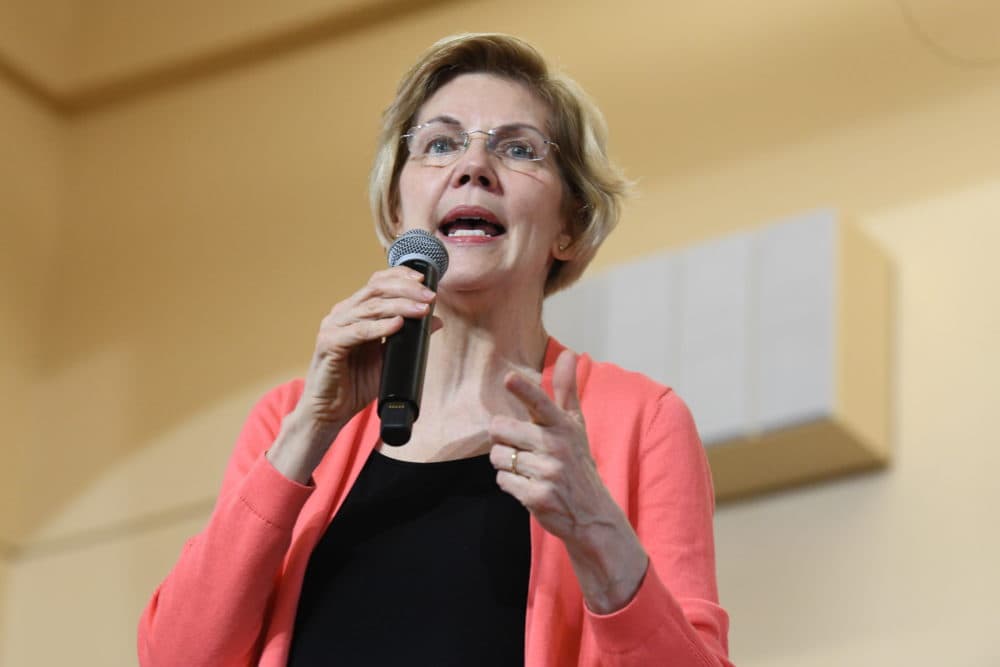Advertisement
Paying For College: Here's What Each Democratic Presidential Candidate Proposes

Student debt could be a key issue in the 2020 presidential race, particularly among the Democratic hopefuls. This week, U.S. Sen. Elizabeth Warren set the bar with the most ambitious plan so far on how to make college more affordable.
Only one other Democratic candidate has proposed a detailed plan to help students and parents lighten the burden of paying for college: U.S. Sen. Bernie Sanders. Nearly every other Democrat has issued some kind of statement on college affordability.
Here's what you need to know about where the candidates stand so far.
Tuition-Free Public College
Warren is proposing tuition- and fee-free public college for everyone and forgiveness of all college loans up to $50,000 for households that earn less than $100,000 a year.
Researchers, lead by Thomas Shapiro at Brandeis University and Raphaël Charron-Chénier at Arizona State University, estimate that Warren's debt-relief plan would cost $640 billion. Warren estimates her tuition- and fee-free public college program would cost an additional $61 billion a year.
Warren would pay for both proposals by imposing a 2% annual tax on the wealth of Americans who have more than $50 million in net worth, and an additional 1% on net worth above $1 billion. Economists at the University of California at Berkeley estimate that proposal would raise $275 billion a year.
Here's how the student debt plan would work: For every $3 that a household makes above $100,000 a year, the $50,000 loan forgiveness would "phase out" by $1. So a family in a household making $130,000 a year would get $40,000 in loans cancelled, while a person in a household making $160,000 would get $30,000 cancelled.
Advertisement
People in households that make more than $250,000 would not get any debt cancelled.
Canceled debt is usually taxed as income. Warren promises to make sure that canceled student loans would not be.
Sanders would impose a financial transactions tax to pay for tuition-free public higher education.
Lower-income taxpayers would not have to fund other people's college education. Those who make up to $50,000 filing individually and $75,000 filing jointly would not pay the financial transactions tax.
UMass Amherst economist Robert Pollin calculates the tax would bring in $220 billion a year. Sanders estimates that his tuition-free public college plan would cost $75 billion a year — $14 billion more than Warren's proposal.
Not Sold On Free Public College
Not all the Democratic candidates support making public college tuition-free.
Minnesota U.S. Sen. Amy Klobuchar has rejected tuition-free public college, although she does support free community college.
At a recent appearance at Northeastern University, South Bend, Indiana Mayor Pete Buttigieg pointed out that Americans with a college degree earn more on average than Americans who don't.
"As a progressive, I have a hard time getting my head around the idea that a majority who earn less because they didn't go to college would subsidize a minority who earn more because they did all the way to 100%," Buttigieg said.
Other Ideas To Pay For College
After Sanders and Warren, the candidate who has come up with the most detailed proposals on paying for college is Mayor Wayne Messam of Miramar, Florida. He is proposing to cancel all federal student loans in full and to pay off all private student loans. He says he would pay for it by rescinding the tax cut Republicans enacted in 2017. He would also impose a 0.5% payroll tax on companies with more than 50 employees, which would fund tuition-assistance programs. Like Warren, Messam would not tax cancelled student loan debt. He would also expand Pell grants.
Self-help author Marianne Williamson is proposing free college for "every qualified student." Williamson proposes that if no "ideal offsets" for this expense are found, she's open to exploring a small payroll tax once students start working or "reasonable amounts" of public service. She also proposes student loan forgiveness, as well as reducing student loan interest rates to a "nominal, if not zero" rate. She would eliminate the annual cap on federally subsidized loans.
Former Maryland Congressman John Delaney is proposing to forgive student loans to people who move to rural America for 10 years. Like Warren, he supports expanding the number of federal student grants to low-income families. And he supports allowing borrowers to discharge student debt in bankruptcy.
California Congressman Eric Swalwell is proposing no-interest federal student loans, tax-free employer contributions to employees' college education and debt-free college for public university students who "commit to bettering their communities after graduation."
Entrepreneur Andrew Yang says he would like to explore making public funding of colleges conditional on their reducing the number of administrators and limiting their annual cost increases to no more than the annual median growth of wages.
In 2015, then-Vice President Joe Biden proposed four years of free college. But when he served in the U.S. Senate, he backed efforts to prevent private student loans from qualifying for bankruptcy protection.
Former U.S. Secretary of Housing and Urban Development Julian Castro supports tuition-free public college.
California U.S. Sen. Kamala Harris is also promising debt-free college. So is former Congressman Beto O'Rourke, of Texas. Neither have offered any specifics, and their campaigns did not respond to requests for more information.
Nor have the campaign of Colorado Gov. John Hickenlooper, the office of Hawaii U.S. Rep. Tulsi Gabbard or the campaign of Gov. Jay Inslee of Washington.
New Jersey U.S. Sen. Cory Booker and Ohio Congressman Tim Ryan support legislation allowing students to refinance their college loans. So does New York U.S. Sen. Kirsten Gillibrand, who also proposes making public universities tuition- and fee- free for families that make up to $125,000 a year.
Massachusetts Congressman Seth Moulton's campaign says he will have a proposal in the coming weeks.
Correction: An earlier version of this report included an earlier estimate for how much money Sanders' financial transactions tax would raise. We regret the error.
This article was originally published on April 25, 2019.
